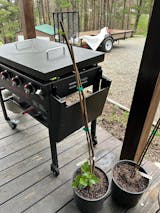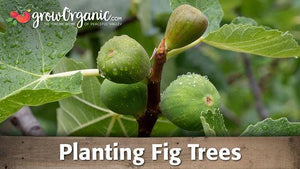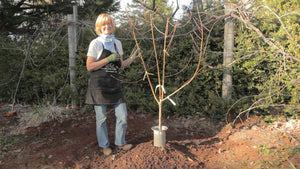Item Number: FT104
Desert King Potted Fig Tree
Heat-tolerant figs with sweet flesh.
The Desert King Fig Tree is a heat-tolerant variety, producing large, sweet figs with green skin and vibrant strawberry-pink flesh. These figs are ideal for fresh eating, baking, or making preserves. Thriving in full sun and well-draining soil, Desert King is particularly well-suited to warm and dry climates. This tree produces a generous breba crop in early summer and may yield a secondary crop in favorable conditions. Reliable and flavorful, the Desert King Fig Tree is a great choice for gardeners in hot regions.
Standard
- Zones: 5-9
- Chill hours: 100
- Harvest: August 10 to November 5
- Looks: Light green skin, strawberry colored pulp.
- Personality: Rich flavor, excellent fresh-eating quality.
- Facts of note: Large breba (spring) crop, although if it is heavily pruned in the winter the breba crop (early crop) could be smaller or none. This variety prefers only light occasional pruning. Light later crop in hot climates, heavier in coastal climates. Well adapted to the Northwest and cooler portions of the South.
- Pollination: Self-fruitful.
Fig trees have been cherished for centuries, offering not only delicious fruits but also ornamental beauty to gardens. Among the many fig tree varieties, the Desert King Fig stands out for its exceptional flavor, adaptability, and resilience.
Characteristics of the Desert King Fig Tree
The Desert King Fig Tree (Ficus carica 'Desert King') is a captivating deciduous tree that can reach a height of 15 to 25 feet when fully mature. It is known for its distinctive and attractive foliage, featuring large, lobed, green leaves that create a lush canopy during the growing season. However, what truly sets this fig tree apart is its exceptional fruit.
Fruit: The Desert King Fig produces medium-sized fruits with greenish-yellow skin and sweet, honey-like flesh. These figs are often enjoyed fresh or used in culinary creations, making them a favorite among gardeners and chefs alike. They have a reputation for being incredibly sweet and flavorful.
Adaptability: One of the remarkable features of the Desert King Fig is its adaptability to various climates. While it thrives in warm, Mediterranean-like climates, it can also be grown successfully in regions with cooler winters. This versatility makes it an excellent choice for gardeners in a wide range of locations.
Fruit Production: The Desert King Fig is a prolific fruit producer. It typically bears fruit in the summer, offering a bountiful harvest that can be enjoyed fresh or preserved for later use. Expect a consistent yield of delectable figs from this tree, especially as it matures.
Caring for Your Tree
To ensure the health and vitality of your Desert King Fig Tree, it's essential to provide proper care and maintenance. Here are some key considerations:
Location: Select a sunny spot in your garden with well-drained soil for planting your Desert King Fig. Full sun exposure is crucial for fruit production and flavor development.
Watering: Figs are relatively drought-tolerant once established, but it's essential to water them regularly, especially during dry spells. A consistent watering schedule, keeping the soil consistently moist but not waterlogged, will help your tree thrive.
Pruning: Pruning is essential for shaping your fig tree and maintaining its size. Prune during the dormant season (winter) to remove dead or diseased branches and promote airflow within the canopy.
Fertilization: Fertilize your Desert King Fig Tree in the spring with a balanced fertilizer to encourage healthy growth and fruit development. Follow recommended application rates for optimal results.
Protection: While the Desert King Fig is relatively hardy, it may require protection from extreme cold temperatures, especially if you live in a cooler climate. Consider wrapping the tree in burlap or applying mulch around the base to insulate the roots during winter.
Benefits of Growing
Growing a Desert King Fig Tree in your garden can offer several benefits:
Delicious Fruits: Enjoy a consistent supply of sweet and flavorful figs throughout the summer months.
Ornamental Beauty: The attractive foliage and the picturesque shape of the Desert King Fig Tree can enhance the visual appeal of your garden.
Versatile Use: Use the figs for fresh snacking, baking, or preserving. They are perfect for making jams, desserts, and even savory dishes.
Adaptability: Whether you live in a Mediterranean climate or a region with colder winters, the Desert King Fig Tree can thrive and provide you with a bountiful harvest.
The Desert King Fig Tree is a remarkable addition to any garden. With its beautiful foliage, delicious fruits, and adaptability, it offers both aesthetic and culinary benefits. By providing the right care and attention, you can enjoy a fruitful and rewarding experience with this exceptional fig tree.
Visit our Fruit Tree Central for a listing of all our fruit tree videos and articles.
Visit Tree Characteristics for a listing of all our fruit & nut tree growing characteristics.


Check Your Zone Compatibility:
Compatible with your zone.
Growing Zone for

Our Guarantee To You
Since 1976, we've served our customers at every stage of growing. Please contact us at any time. We are happy to support and assist you.
Shipping Information
Shipping Information
Cannot ship to the following states: HI, AK, PR, GU, VI
Shipping Weight: 5.5 lb
Dimensions: 35.9"L x 3.9"W x 3.9"H
Features
Features
- Potted
- Self-fruitful
- Suited to Warmer Climates
Characteristics
Characteristics
Planting & Care
Planting & Care
Useful Information
Useful Information
Guarantee
Guarantee
We guarantee the perishable items we sell to be in good, viable condition when we sell them. Perishable items include, but are not limited to, garlic bulbs, flower bulbs, seed potatoes, onion sets & transplants, potted or bare root trees, vegetable crowns, etc. If your perishable item arrives in substandard condition, take photographs and please contact us within 3 days of the purchase date (or delivery date) and we will provide you with a refund of the purchase price (excluding shipping costs), or a replacement. Accordingly, we urge you to open any boxes marked as ""Perishable"" immediately upon receiving them and inspect the shipment thoroughly (do not crack open heads of garlic, we do not accept claims on cracked garlic). Because some perishable items can deteriorate very quickly, we cannot accept any claims beyond the 3-day time frame as it becomes too difficult to determine if these items were delivered in substandard condition, or if they turned into such substandard condition because of having been improperly cared for or stored once delivered.
Share
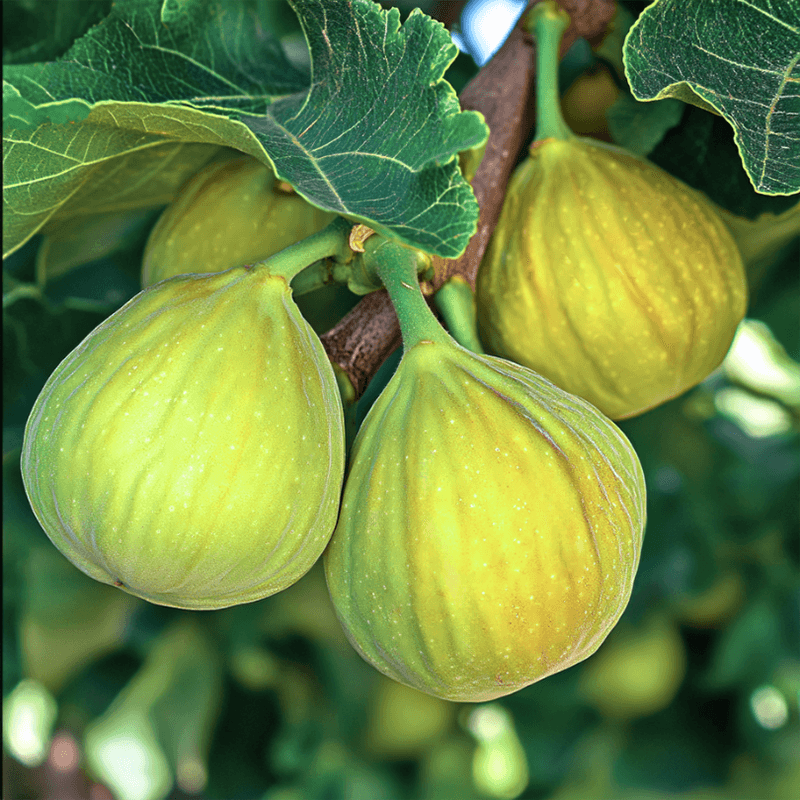
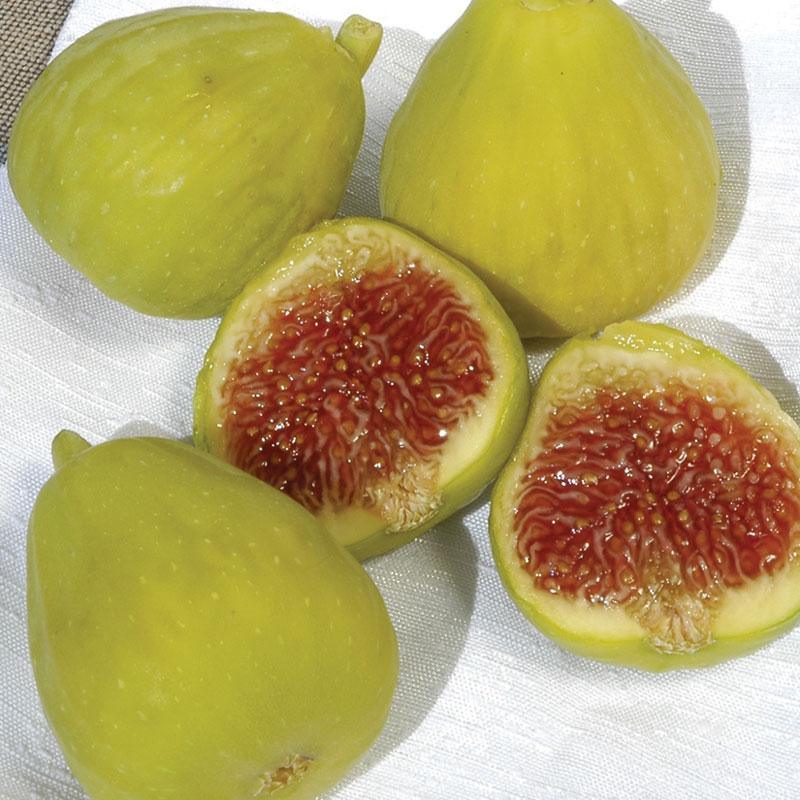
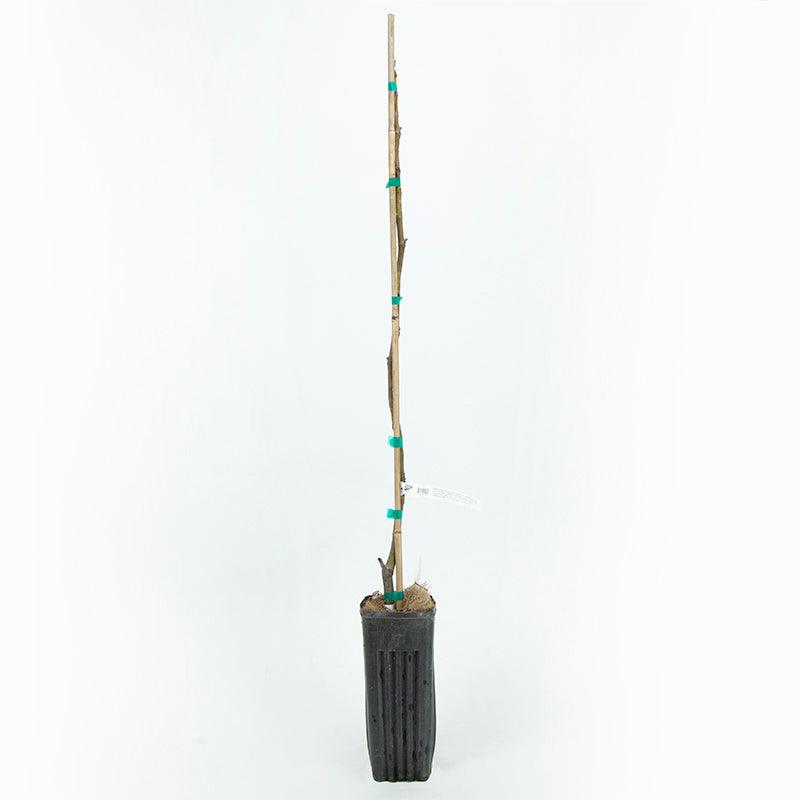
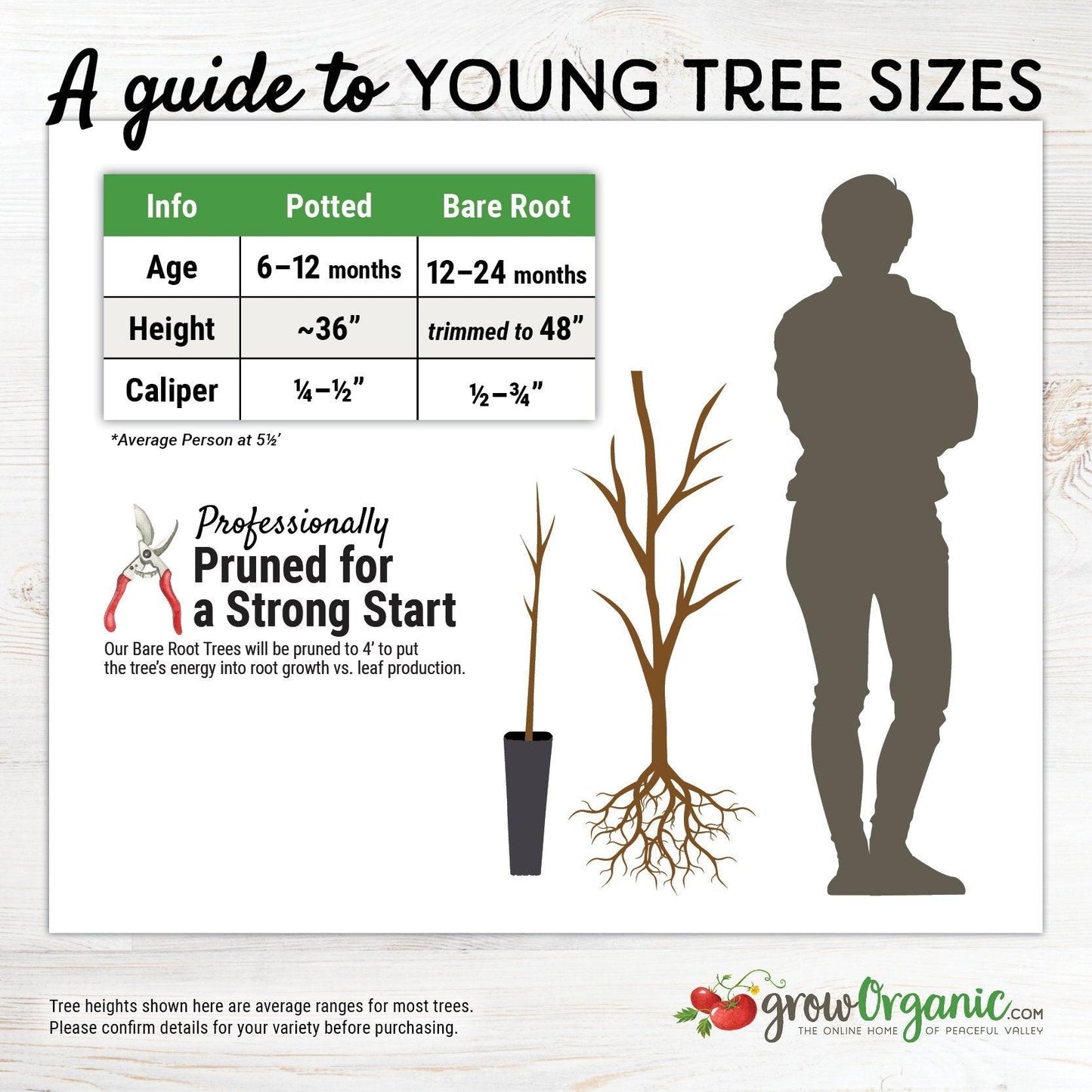
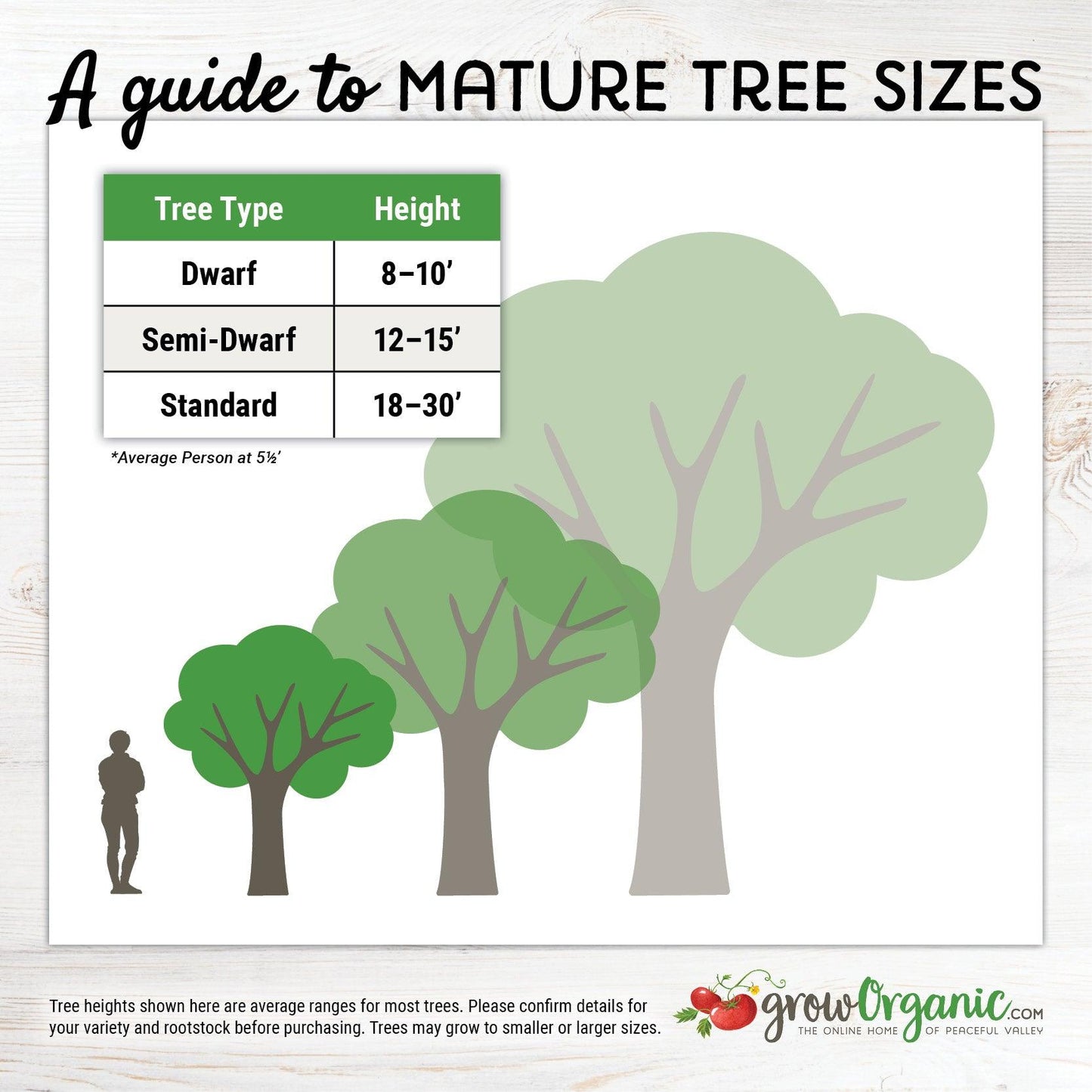
Very good size healthy plant! it’s been too cold to put outside still so it’s in a pot at the moment.
It had good roots and it was maybe 2 or 3 feet long. It was dormant and roots were moist. I hope it grows because that week we had a hard freeze.
The tree, just like every time I've bought here, arrived in wonderful healthy condition and I expect it will grow wonderfully. However, I'm still a bit new to fig growing so instead of doing my own research of this tree I just believed what was in the description for it. Unless you live in an area with fig wasps you will NOT be getting a main crop and the only thing you will harvest from this tree will be the breba figs that will grow off the old tree growth b/c those don't require pollination via wasps. The main crop figs will simply fall off but as long as you don't prune the tree very much you can get a decent sized breba crop the next year. The bigger you let the tree get the bigger the breba crop. So in a way it is self fruitful but at the same time its not. I was a bit disappointed but the tree will still be useful for that breba.
This fig tree seems Very vigorous with lots of leaves and is already bearing fruit after being in the ground just a few months!
It arrived as a thick stick in the container shown in the listing. I’ve had it in my sunroom for a month waiting to be planted. I was excited to see the leaves emerging from the top - and then 5 breba figs along the stem already! Wow!






